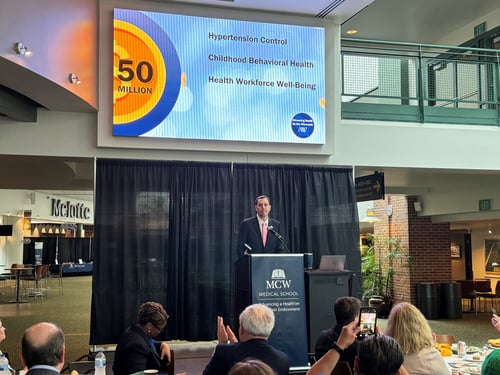Our Story
Beginning in the 1930s, nonprofit Blue Cross voluntary pre-paid hospital plans were created across the U.S. to provide affordable healthcare coverage to millions of Americans. Wisconsin Blue Cross was chartered in 1939 as a “charitable and benevolent corporation” to cover hospitalization costs, later adding coverage for physician services and growing to become the state’s largest health insurer as Blue Cross & Blue Shield United of Wisconsin in the decades that followed. In 1994, the Blue Cross and Blue Shield Association voted to allow its nonprofit members to become for-profit corporations. Blue Cross & Blue Shield plans interested in converting to for-profit entities would have to divest their assets.
In Wisconsin, Blue Cross & Blue Shield United’s transformation, precipitated by the planned retirement of its CEO, resulted in a $618 million gift made in 1999 to the people of Wisconsin, split evenly between the state’s two medical schools—the University of Wisconsin School of Medicine and the Medical College of Wisconsin.
Learn more about AHW’s history and impact in Wisconsin—from the time we made our first grant awards in 2004 to our rise to become Wisconsin’s largest health philanthropy.
Our 20 Year History
Timeline of Events
1999
Blue Cross & Blue Shield United of Wisconsin announces that it will be converting from a non-profit organization to a proprietary firm. The company announces that as part of the conversion process, it will donate the company’s assets equally between the Medical College of Wisconsin and the University of Wisconsin School of Medicine. The donated funds are to be used to improve the quality of health for the citizens of Wisconsin.
MCW and UW-Madison School of Medicine host the first of nine statewide listening sessions to gather public input on Wisconsin’s health needs. The first sessions are held in Stevens Point and De Pere. Information gathered will be evaluated for inclusion in the medical schools’ plans for use of the Blue Cross & Blue Shield United of Wisconsin endowment. The endowment is valued at $125 million.
2000
2001
Cheryl Maurana, PhD, is named MCW Senior Associate Dean for Public Community Health, becoming the founding director of the Advancing a Healthier Wisconsin Endowment. Dr. Maurana served as AHW director for twenty years, during which time AHW invested approximately $275 million in nearly 200 initiatives to improve health across Wisconsin.
2002
2003
2004
2005
2006
2007
2008
2010
2013
The MCW Board of Trustees approves AHW’s 2014-2018 Five Year Plan entitled, Moving from Grantmaker to Changemaker. This innovative focus, which received national attention, leverages resources to build capacity, innovate and catalyze change for health improvement across Wisconsin. Changemaker roles include that of high-impact investor, learner, convener and influencer.
2014
2015
2016
2018
2019
AHW makes a $1.6 million investment into reducing cancer disparities by supporting community and MCW academic partners in an innovative effort to identify strategies that cut across community, research, and education to impact how we understand and approach breast and lung cancers in Wisconsin.
Jesse M. Ehrenfeld, MD, MPH, is named Senior Associate Dean and Director of the Advancing a Healthier Wisconsin Endowment, effective September 1, 2019.
2020
2021
Nationally recognized surgical oncologist and health disparities researcher Ugwuji Maduekwe, MD, MMSc, MPH, joins AHW as deputy director, later receiving the title of associate dean.
2023
2024


